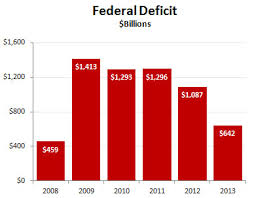记忆方法
将“deficit”分解为“de-”和“ficit”,其中“de-”表示“往下”或“减少”,“ficit”则来源于“fict”,表示“做”或“形成”。结合起来,可以想象为“往下形成”或“减少形成”,即意味着某种“亏空”或“短缺”,这样就能记忆“deficit”为“赤字、亏损”的意思。
以上内容由AI生成, 仅供参考和借鉴
中文词源
deficit 赤字
de-, 不,非,使相反。-fic, 做,词源同defect, efficient. 即没做好,出现赤字的。
英语词源
- deficit (n.)
- 1782, from French déficit (late 17c.), from Latin deficit "it is wanting," an introductory word in clauses of inventory, third person singular present indicative of deficere "to be deficient" (see deficient).
权威例句
- 1. These will be very constrained budgets designed to get the deficit down.
- 这些预算旨在减少赤字,将会大大受限。
- 2. By 1973 the government deficit equalled thirty per cent of GNP.
- 到1973年,政府财政赤字相当于国民生产总值的30%。
- 3. He recovered from a 4-2 deficit to reach the quarter-finals.
- 他在2比4落后的情况下实现逆转闯进1/4决赛。
- 4. The US trade deficit widened to $7.59 billion in November.
- 11月美国的贸易赤字扩大到75.9亿美元。
- 5. He promised to get to work on the state's massive deficit.
- 他承诺着手解决国家庞大的财政赤字问题。
